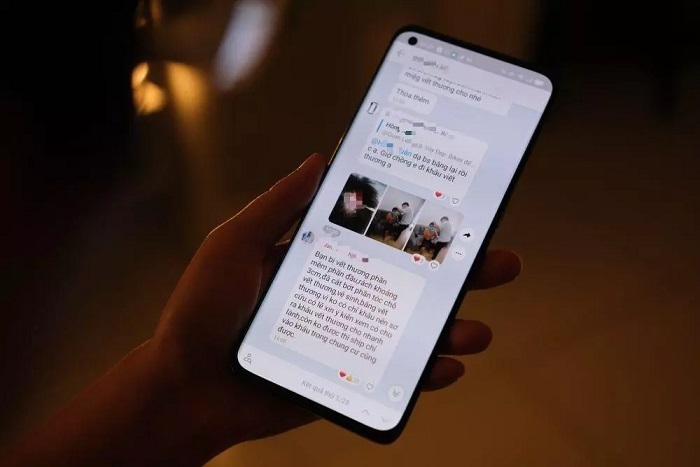 |
|
The Facebook page of residents of an apartment building in HCM City.
|
On the evening of July 6, two blocks of 8X Dam Sen apartment building in Tan Phu District in Ho Chi Minh City were locked down after 10 residents were suspected of being positive for the Covid-19 virus. More than 1,000 people living there were confused because they had not prepared for this scenario.
The teachers who had to supervise the high school exams the next day, the factory workers, and the people who sell goods online and deliver goods to customers all wondered if their jobs would count as "essential" and they would not be required to quarantine.
Questions were posted on the apartment building's Facebook page. The page, which was previously boring with announcements of the apartment management board and small ads, has become very active since that day.
On the night of the blockade, one resident set up a Zalo chat group. So far, half of the apartment residents have joined this group. A few days later, another Zalo group specializing in buying and selling goods was set up. Later, Zalo groups of residents living on certain floors were created and so on.
The loudspeaker of the apartment building was still used to spread announcements as usual, but local residents now prefer to exchange information in their groups.
Solving personal problems
 |
| The images of a doctor dressing his neighbor was posted on the Zalo group of a residential area. |
On the second day of the blockade, a local resident had an accident. The man's wife, after dressing the wound on her husband’s head, asked for advice from other residents of the building’s Zalo group. An hour later, the woman posted some photos of her husband with the wound re-dressed professionally by a local resident, who is a doctor.
Two days later, a pregnant woman was tired and bleeding profusely. Neighbors gathered to help but the doctor told the family to send the woman to hospital for an emergency. Another resident did not hesitate to use his car to take the woman to the hospital, because it was difficult for an ambulance to arrive in time during the epidemic, when the medical forces were overloaded. Exactly 20 minutes after the information was posted on the apartment’s Zalo group, the photos taken of the pregnant woman in the hospital were uploaded.
Just like that, social media was used by residents and the management board of this apartment building.
In many places, Facebook pages have become the tool to distribute mainstream information by local agencies, such as the people’s committees and health divisions of wards and communes during the pandemic.
Even when it is necessary to consult residents, the management board of apartments just needs to set up a "poll" on Facebook for local people to vote. The vote result is very clear and transparent.
Meanwhile, Zalo chat groups are more dynamic, filled with information exchanged among residents. How to treat children with eyesores, where to buy gas, which floors where residents have been tested, etc. Such information is updated on these chat groups.
… and the government’s media stories
 |
| The Facebook page of the Vietnamese government. |
Such daily trifles, if not being resolved quickly, can inhibit people, especially in the time of epidemic when they are under a lot of pressure.
Without the help of social networks and multimedia messaging platforms to connect and solve daily life problems, people's lives can be even more difficult and it is easy to cause social unrest.
While having to stay indoors, thanks to social networks, people still feel real life going on and get updated information. Through these platforms, people are connected.
On a larger scale, everyone can see the effect of social networks in communication in epidemic prevention. Information from the Ministry of Health and from the Government is regularly and officially updated on Zalo, Facebook, and Google.
Every day, tens of posts are updated on the Facebook page of the Government and each post gets thousands of likes. This shows that the central government uses social media very effectively.
In Ho Chi Minh City alone, many Facebook pages of government agencies are also very effective. The page of the HCM City Center for Disease Control regularly updates the situation of pandemic and related policies. The page of the Ho Chi Minh City Press Center is quickly updated with useful information from the local media, focusing on the prevention of the Covid-19 epidemic. The Vietnam Youth Union's pages effectively call for youth to participate in voluntary campaigns.
It is undeniable that the role of social networks is extremely important, especially in the current situation. During the pandemic, there is no other medium that spreads information as quickly, widely and effectively as social media.
Of course, every tool has its downside. Measures should be taken to prevent fake news on these pages.
Hai Dang

Social media corrupting our behavior: official
The utility of social networks is depraving the behavior of many people. Be wary of negative effects from the ‘virtual’ world, said Nguyen Thanh Lam, Director of the Authority of Press under the Ministry of Information and Communications (MIC).

Joining forces to clean up cyberspace
Many livestreams, where ‘social network gangsters’ feel free to curse and insult others, have been organized online, attracting thousands of likes.